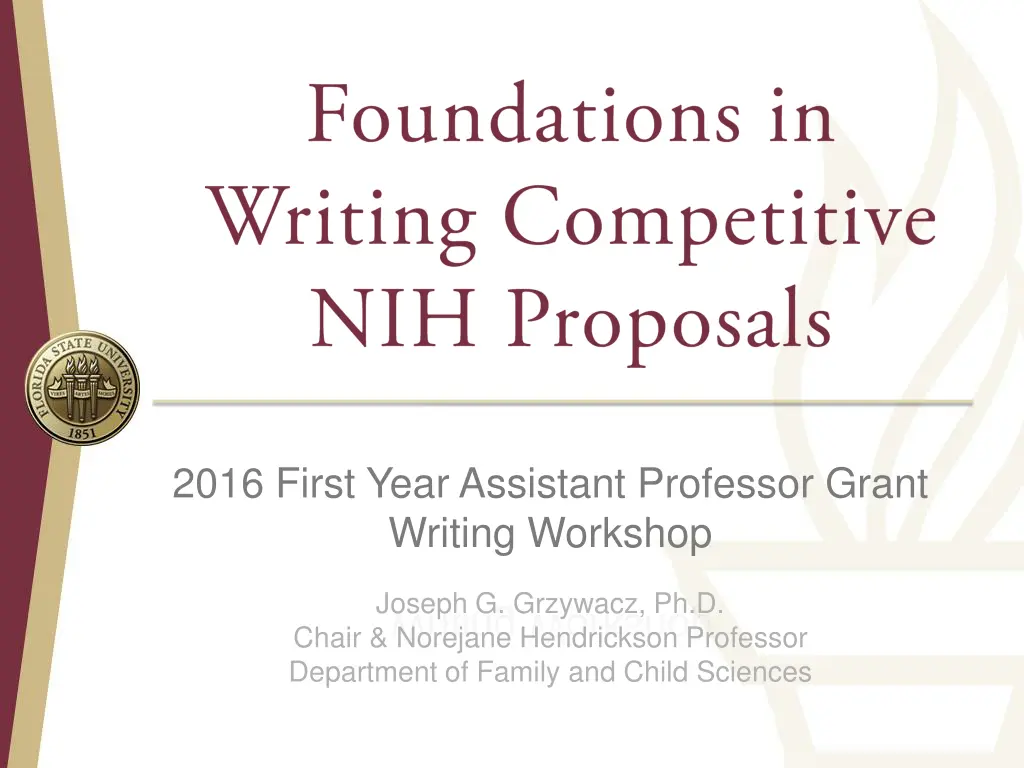
Grant Writing Workshop for Assistant Professors
Join the Grant Writing Workshop led by Dr. Joseph G. Grzywacz and Norejane Hendrickson to gain insights on obtaining your first NIH grant, dispelling funding myths, and improving your grant-writing skills. Learn key strategies for achieving favorable reviews and increasing your chances of funding success.
Download Presentation

Please find below an Image/Link to download the presentation.
The content on the website is provided AS IS for your information and personal use only. It may not be sold, licensed, or shared on other websites without obtaining consent from the author. If you encounter any issues during the download, it is possible that the publisher has removed the file from their server.
You are allowed to download the files provided on this website for personal or commercial use, subject to the condition that they are used lawfully. All files are the property of their respective owners.
The content on the website is provided AS IS for your information and personal use only. It may not be sold, licensed, or shared on other websites without obtaining consent from the author.
E N D
Presentation Transcript
2016 First Year Assistant Professor Grant Writing Workshop Joseph G. Grzywacz, Ph.D. Chair & Norejane Hendrickson Professor Department of Family and Child Sciences
Goal: Enable emerging investigators in obtaining their first NIH Grant Specific Aims Delineate and dispel entrenched myths about obtaining grant funding from the National Institutes of Health (NIH) Illustrate common errors in grant-writing made by inexperienced investigators Describe strategies for favorable reviews (and greater potential for funding)
1998 Ph.D. in HDFS from the University of Wisconsin Continuous NICHD Funding since 2003 R03 (perfect score) R21 3 R01s (perfect score on most recent) Co-I on several R01s funded by NIA, NIEHS, NIOSH In 2012, 2nd highest funded NIH investigator across all departments of Family Medicine nationally Standing member of 2 NICHD Review Subcommittees Ad-hoc Review on several CSR review committees
NIH only funds hypothesis-testing research NIH is not interested in conceptually-grounded research Reviewers are experts on the topic and methods of my study Program officials have a lot of sway over funding decisions Favorable reviews depend on the luck of the draw There are tried-and- true methods for grant-writing
Forgetting the NIH Mission Diluted or ambiguous specific aims Determine the relationship between the psychosocial stressors, biobehavioral health, and health outcomes. Confusing significance and innovation Significance: what critical problem is the work addressing Innovation: how does the work move beyond status quo Background overkill Misalignment in Design Description Over-focus on analyses in a primary data collection project Under-focus on issues of sample design, loss to follow-up in secondary data analysis projects
1. Psychology of the Reviewer 2. Write each section with an eye toward the review criterion What is the critical barrier in the evidence base, and how will overcoming this barrier advance health? (Significance) The investigator(s) are well-equipped to accomplish the stated aims. (Investigators) The research uses novel techniques or concepts. (Innovation) The study design, recruitment and data collection techniques, measurement, and analyses are appropriate for achieving the scientific aims. (Approach) The environment supports the likelihood the proposed project will be successfully completed (Environment)
1. Psychology of the Reviewer 2. Write each section with an eye toward the review criterion 3. Anchor the project in well-defined specific aims Clear aims will have apparent requirements for study design, key measurements, and relevant analyses 4. Use strong writing Shorter, active sentence structure Word selection (e.g., scholars suggest versus investigators argue ) Make your point in the thesis sentence 5. Structure is your friend
Joe Grzywacz Family & Child Sciences jgrzywacz@fsu.edu 850-644-2484






















